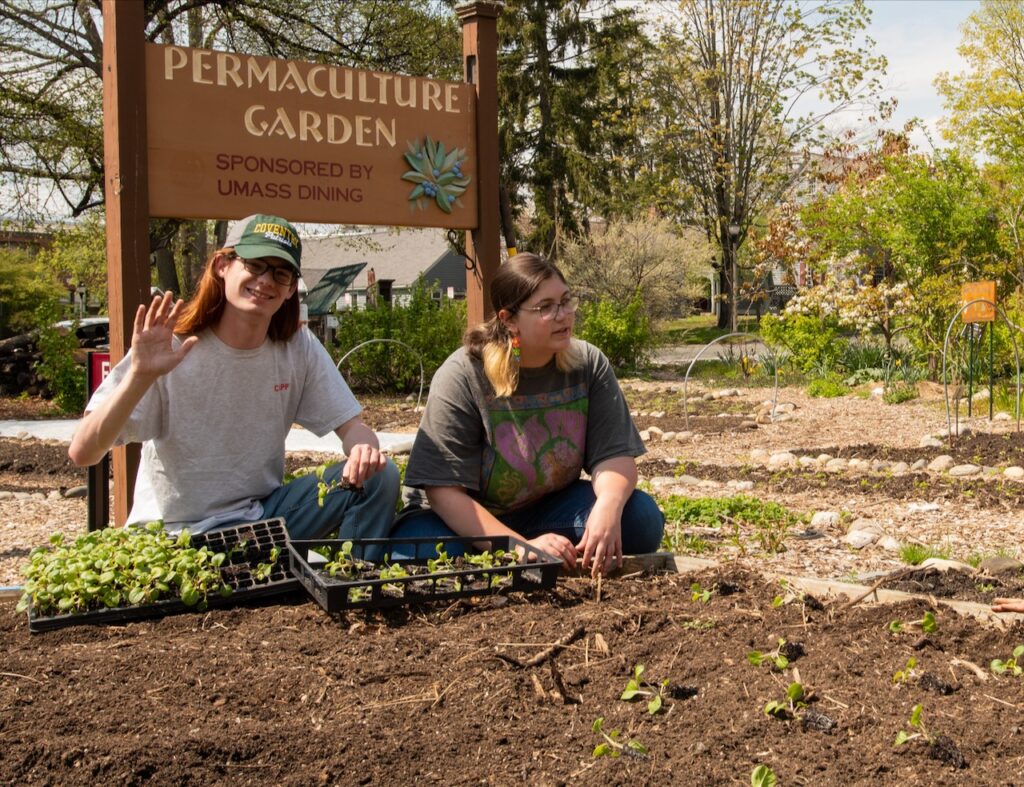UMass Farmers Are Creating A Food Culture Through Permaculture

Photo: Keith Toffling
Source: UMass News and Media
“What does it mean to truly live in a place and be shaped by that place?” asks Daniel Bensonoff, the coordinator of the UMass Permaculture Initiative, on a beautiful May day. “How we grow our food determines how we use our world,” he says as he gestures to the shitake mushroom logs, beehives, blueberry bushes and rice paddy surrounding him as he sits in the Franklin Permaculture Garden, UMass Amherst’s permaculture hotspot.
Many associate permaculture — a portmanteau combining “permanent” and “agriculture”— with a specific type of farming that emphasizes long-term sustainability and which looks to natural systems for its design inspiration. “But,” says Bensonoff, “it is so much more than that. We permaculturists are guided by principles of Earth-care, people-care, and fair share. Permaculture is relevant for anyone who wants to design anything, from a vegetable garden to a civilization.”
If the success of the campus’s Permaculture Initiative — a collaboration between UMass Dining and the Stockbridge School of Agriculture — is any indication, then permaculture certainly seems to be creating a vibrant, healthy, exciting local culture that students flock to.
“I’ve been working in the permaculture garden for four full semesters,” says Jo Fuchs, a rising senior studying sustainable food and farming. “I love being there more than any other place on campus, and it has been the cornerstone of my UMass experience.”

As Bensonoff tours Franklin Garden’s five zones, each designed around a different kind of growing environment and packed with food, medicine and wildlife-attracting plants that thrive under those conditions, it’s hard not to notice all the people likewise wandering around the garden’s paths, from student-farmers to staff taking a breath of fresh air during a coffee break. Occasionally a chef from Franklin Dining Commons will make a quick run to the garden’s plot of herbs. Over half of the garden’s produce, which annually averages approximately 2,000 pounds, goes to UMass dining, and the rest can be found at the UMass Farmers’ Market and the Amherst Survival Center. All this on a half-acre plot of land.
Franklin Garden was built in 2011, and since then has attracted thousands of students, classes, tours and volunteers.
“I got involved through open volunteer hours mostly because the permaculture people I met were so enthusiastic about it,” says Juliana Green, a rising senior studying sociology, social thought and political economy. “Working with the Permaculture Initiative has been transformative, personally and academically, and it has given me a sense of where I want to take my studies.”

“People come in part because it’s fun to work together,” says Bensonoff. “Farming was historically a social activity.” And the interest is spreading. There are now four permaculture gardens on campus, and the newest, located between Franklin Dining and Thatcher Road, has just had its raised planters sown with its inaugural crop of lettuce and assorted herbs. Peanuts, ginger, sesame and chili are on the way. “This newest garden is geared toward showcasing what an urban permaculture garden might look like; it’s ADA compliant, able to withstand lots of hungry wildlife, and accessible to children and senior citizens,” says Bensonoff.
When asked what he sees as the future of permaculture at UMass, Bensonoff replies that his dream is to have an edible corridor on campus. “Imagine walking to your class or office, and, depending on the time of year, picking an apple or grabbing a handful of blueberries, pulling a carrot or a few leaves of lettuce for your lunch. Beyond just growing more food, my hope is that the experiences students have in the gardens sows seeds of love and respect for the greater-than-human world.”
